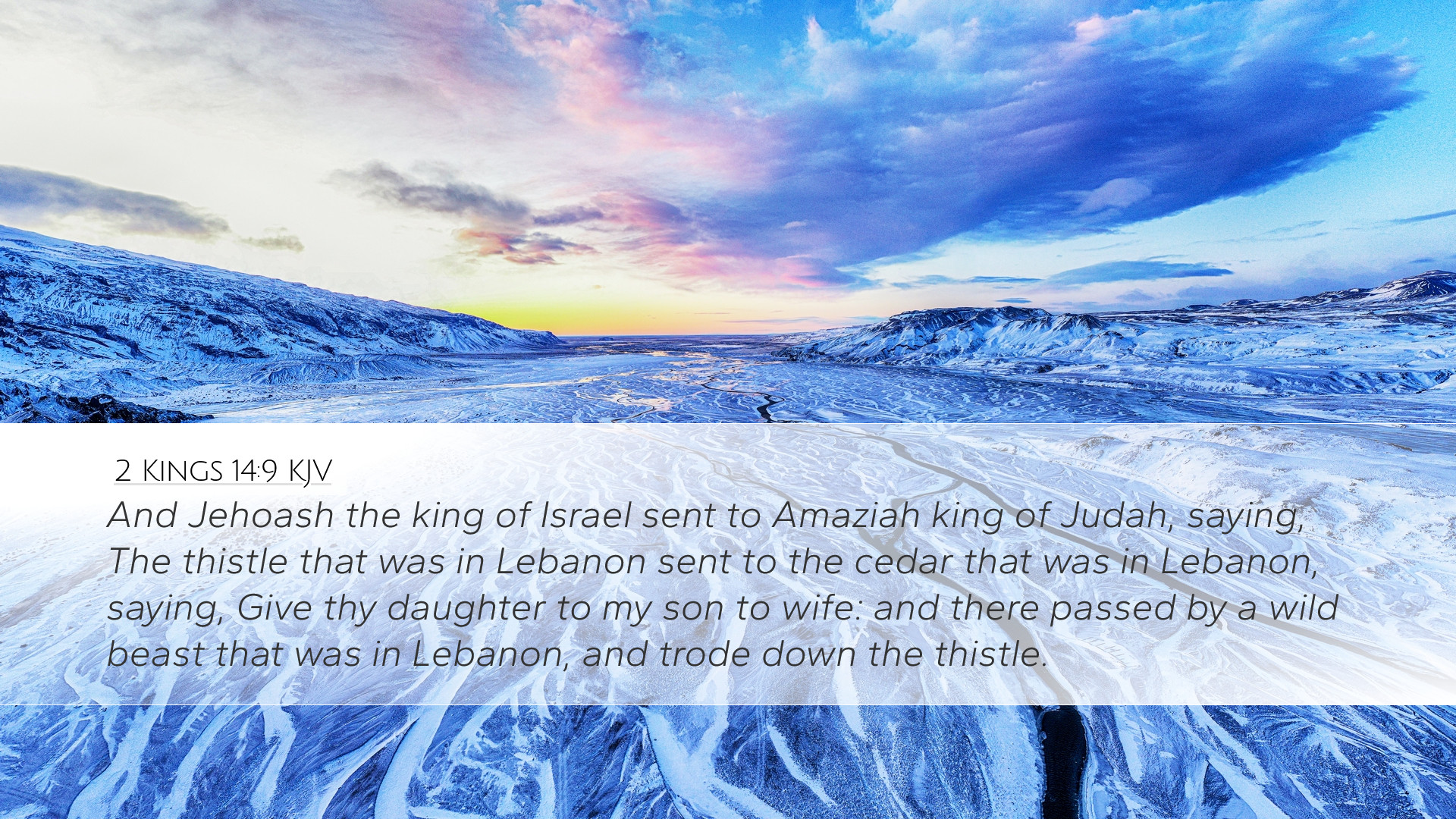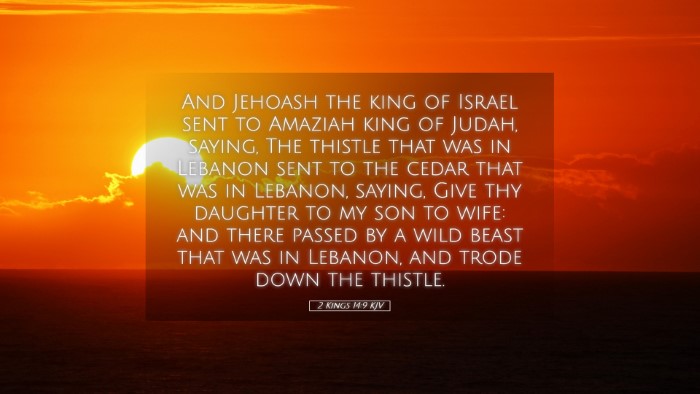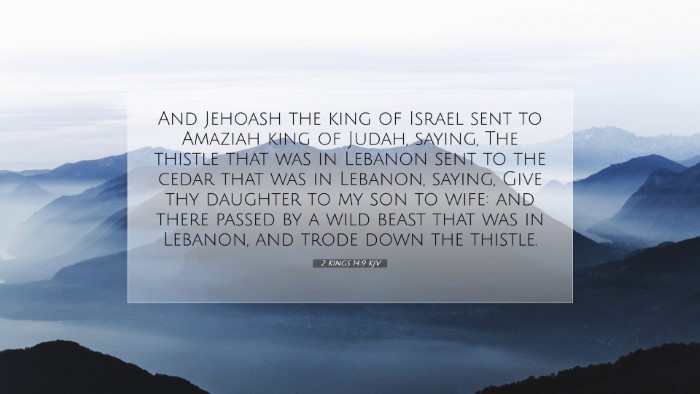Commentary on 2 Kings 14:9
Verse Context: 2 Kings 14:9 states, "And Jehoash the king of Israel sent to Amaziah king of Judah, saying, 'The thistle that was in Lebanon sent to the cedar that was in Lebanon, saying, "Give thy daughter to my son to wife." And there passed by a wild beast that was in Lebanon, and trode down the thistle.'
Introduction
This verse is part of a narrative that illustrates the interaction between King Amaziah of Judah and King Jehoash (Joash) of Israel. The metaphorical language used here carries deep meanings about pride, overestimation, and the eventual downfall of those who seek alliances without prudence. We will delve into the insights from Matthew Henry, Albert Barnes, and Adam Clarke, each offering a unique perspective that can enhance our understanding of this passage.
Matthew Henry's Commentary
Matthew Henry emphasizes the metaphor contained in Jehoash’s message, suggesting that it reveals the folly of pride. He interprets the thistle, a symbol of smallness and insignificance, seeking a marriage alliance with the mighty cedar, which represents strength and grandeur. Henry notes that Jehoash cleverly points out the absurdity of Amaziah's ambition. He states:
"When the lowly presumptuously aims at the high, disaster is often not far behind."
Through this comparison, Henry warns against overestimating one's position and the dangers of being ambitious to the point of foolishness. The “wild beast” that tramples the thistle serves as a reminder that there are forces beyond one's control that can lead to humiliation. Such divine providence is an essential theme in the history of Israel, underscoring that arrogance can lead to ruin.
Albert Barnes' Analysis
Albert Barnes provides a textual analysis that focuses on the relationship between Israel and Judah during this period. He interprets the message as an expression of Jehoash’s disdain for Amaziah’s aspirations. According to Barnes, the thistle’s proposal to the cedar signifies Amaziah’s ambition to align himself with a more powerful kingdom:
"This message carries a dual message: a warning against pride and an affirmation of the strength of God’s providence over human efforts."
Barnes also highlights that the wild beast, trampling down the thistle, symbolizes the inevitable consequences of such prideful attempts. He emphasizes the idea that theological and political alliances are not merely matters of human planning but are subject to God's sovereignty. In doing so, Barnes points to the prophetic context, indicating that all human enterprises fall under divine scrutiny.
Adam Clarke's Interpretation
Adam Clarke approaches the verse with a detailed linguistic analysis and historical background. Clarke points out that the "thistle" represents the Kingdom of Judah, which is smaller and weaker relative to the "cedar" of Israel, a symbol of power and influence. He explains further,:
"Jehoash’s reply is rich in meaning; it serves to convey that Judah's aspirations were misguided and her strength feeble compared to the might of Israel."
Clarke elaborates on the potential motivations behind Amaziah's actions, suggesting that he may have sought to strengthen his position through alliances, common in royal diplomacy. He notes the futility of such endeavors when not aligned with God’s will and purposes. Clarke uses this verse to remind readers of the overarching theme of divine control in human affairs, asserting that God often allows tribulations to occur in order to teach humility and reliance on divine wisdom.
Theological Reflections
Combining these insights fosters a comprehensive understanding of the implications this verse has for contemporary believers:
- Pride and Ambition: Each commentator highlights the dangers of pride and overreaching ambition. For pastors and theological students, the message serves as a reminder to approach their ministries with humility.
- Divine Sovereignty: The emphasis on God’s control over human decisions is a crucial theological principle. Scholars can explore how this impacts contemporary views on leadership and governance.
- Alliances and Relationships: The metaphor of the thistle and cedar invites pastors to reflect on healthy relationships, reminding them that human alliances must be guided by wisdom and divine direction.
- Symbolism and Metaphor: By examining literary tools, it encourages deeper engagement with scriptural texts, enhancing interpretive skills among students and scholars.
Conclusion
2 Kings 14:9 serves as a rich ground for reflection on the nature of human ambition in the light of divine sovereignty. The insights from Matthew Henry, Albert Barnes, and Adam Clarke each provide depth to understanding this text, reminding readers of the necessity of humility before God and the limits of human power. For pastors, students, and scholars, this verse challenges them to consider the implications of their ambitions and the need for divine guidance in all endeavors.


